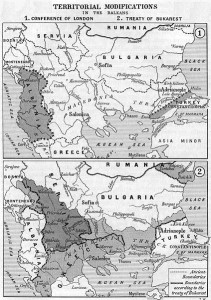Pervjetori i Konferencës së Paqes në Londër

Ndryshimi i Kufijve te Ballkanit sipas Konferences
Më 3 dhjetor 1912 u nënshkrua Armëpushimi për t’i dhënë fund Luftës së Parë Ballkanike. Në St James’s Palace nën drejtimin e Sir Edward Grey filloi punimet Konferenca e Ambasadorëve në Londër.
Konferenca, vazhdoi punimet në 1912-1913, ajo u njoh ndryshe si “Konferenca e Paqes në Londër”. Konferenca ishte një takim ndërkombëtar i gjashtë Fuqive të Mëdha të asaj kohe (Britania e Madhe, Franca, Gjermania, Austro-Hungaria, Rusia dhe Italia). Këto fuqi u mblodhën në dhjetor 1912 si pasojë e sukseseve të ushtrive të Ligës ballkanike kundër Perandorisë Osmane në Luftën e Parë Ballkanike. Konferenca u përpoq të luante rolin e arbitrit ndërmjet fuqive ndërluftuese për çështjen e shpërndarjes së tokave dhe gjithashtu përcaktoi të ardhmen e Shqipërisë, e cila deklaroi pavarësinë gjatë Luftës së Parë Ballkanike.
Konferenca e Londrës u ndoq nga delegatët e vendeve të Ligës ballkanike, përfshi Perandorinë Osmane dhe Greqinë, e cila nuk kishte nënshkruar armëpushim.
Sesionet e Konferencës vazhduan më 16 dhjetor 1912, po u ndërprenë pa ndonjë konkluzion më 23 janar 1913, kur në Perandorinë Osmane u zhvillua një grusht shteti.
Më 30 maj 1913, Konferenca rifilloi punimet dhe nënshkroi Traktatin e Londrës, një marrëveshje sipas së cilës Perandoria Osmane hiqte dorë nga të gjitha territoret në perëndim të kufirit Enos-Midia. Pas shumë diskutimesh, më 29 korrik 1913, ambasadorët morën një vendim formal për të njohur Principatën e Shqipërisë si Shtet Sovran të Pavarur nga Perandoria Osmane. Por si rezultat i presionit nga Greqia dhe Serbia Konferenca mori vendim që përgjysmoi territorin e Shqipërisë dhe rreth 40% e popullsisë shqiptare u la jashtë kufijve të Principatës së Shqipërisë së krijuar. Kështu Vilajeti i Kosovës iu dha Serbisë dhe Çamëria Greqisë, gjithashtu mbetën jashtë territore të tjera shqiptare ne pjesën veriore dhe lindore të Shqipërisë.
Konferenca caktoi një Komision special për të përcaktuar kufirin shqiptaro-grek dhe më pas mori vendim për ti dhënë Greqisë Epirin Jugor, një tokë të banuar historikisht nga shqiptarë etnikë.
Por shtetet ballaknike mbetën të pakënaqur nga Kongresi, dhe menjëherë filluan Luftën e Dytë Ballkanike.
Teksti i Konferencës së Paqes
The Treaty of London, 1913.
1. FIRST MEETING OF THE LONDON PEACE CONFERENCE, DECEMBER 16, 1912.
The armistice for the cessation of the First Balkan War was signed on December 3, 1912, and the London Peace Conference, composed of delegates from the Balkan allies, including Greece, who had not signed the armistice, and Turkey, held its first meeting on December 16, 1912. At the same time a Conference of Ambassadors, consisting of Sir Edward Grey and the London representatives of all the powers, was also in session.
2. DEMANDS OF THE BALKAN ALLIES.
The Balkan allies demanded a war indemnity, as also the cession of all European Turkey (excepting Albania), Crete, and the islands in the Aegean Sea. Turkey was to be allowed to retain Constantinople, together with a strip of territory extending from Midia on the Black Sea to Rodosta on the Sea of Marmora, as also the peninsula of Gallipoli or the Thracian Chersonese.
Turkey was unwilling to give up Adrianople, a sacrifice insisted upon by Bulgaria. The “Divan,” or Turkish National Assembly, decided, however, on January 22, 1913, that the demands of the allies must be conceded. Kiamil Pasha telegraphed the Turkish commissioners at London that same night, directing them to yield Adrianople and agree to the cession of all Turkey in Europe beyond a line running from Enos on the Aegean Sea, at the mouth of the Maritza River, to Midia on the Black Sea.
3. COUP D’ÉTAT OF JANUARY 23, 1913, AT CONSTANTINOPLE.
But on the following day, January 23, as a result of a successful coup d’état, Kiamil Pasha was driven from power and Nazim Pasha murdered by Enver Bey, who placed himself at the head of a new government. When the news of the coup d’état reached London it was recognized that further negotiations were useless and that the London Peace Conference had failed.
4. TERMS PROPOSED BY THE POWERS.
Adrianople having been captured by the Bulgarians, assisted by the Serbs, on March 28, 1913, the time was ripe for a resumption of peace negotiations. On March 22 the great powers had proposed the following terms as a basis for the renewal of negotiations: (1) A frontier line from Enos to Midia to follow the course of the Maritza, and the cession to the allies of all the territories west of that line, with the exception of Albania, whose status and frontiers were to be determined by the powers. (2) The question of the Aegean Islands to be decided by the powers. (3) Turkey to abandon all claims to Crete. (4) The powers would not entertain favorably the demand for an indemnity, but were willing to admit the allies to participation in the discussion of an international commission which should meet in Paris for the equitable settlement of their participation in the Ottoman debt and the financial obligations of the territories newly acquired. Turkey was to be asked to take part in the labors of this commission. (5) An end of hostilities immediately after the acceptance of this basis of negotiations
Turkey agreed to these stipulations, but the allies insisted, among other things, that the Aegean Islands be ceded directly to them and were eager for an indemnity.
5. SECOND MEETING OF THE LONDON PEACE CONFERENCE, MAY, 1913.
It was not until April 20 that the Balkan States finally agreed to accept the mediation of the powers. When the Balkan delegates and the representatives of the great powers finally met for the second time at London on May 20 they found a treaty embodying the original terms of the powers all ready for them to sign. They demurred at first, but when, on May 27, Sir Edward Grey, frankly told them that they must either sign or leave London they signed without much further delay on May 30, 1913.
6. DISCUSSION AMONG THE BALKAN ALLIES.
The long delay in the negotiations was largely due to differences among the allies regarding the division of the spoils. Mutual hatred and suspicion and conflicting territorial ambitions made agreement almost impossible. The action of the Conference of Ambassadors in regard to Albania added greatly in the difficulty of the situation, since Serbia was thereby prevented from extending its territory westward to the Adriatic and would be left with only a relatively small recompense for its sacrifices in the war, unless Bulgaria could be induced to consent to a modification of the Serbo-Bulgar treaty of March 13, 1912, a thing to which she was unwilling to agree. Even before the declaration of war Serbia had suggested a rectification of her frontier as outlined in the Serbo-Bulgar treaty of March, 1912. Her demands grew with her victories, with the free hand in Macedonia allowed her and Greece by Bulgaria’s preoccupation in Thrace, and with her exclusion from the sea by the creation of Albania. Bulgaria, on the other hand, cared intensely for expansion in Macedonia. Very bitter feeling was generated between Bulgaria and Serbia, culminating in warlike preparations, some actual hostilities, and a final demand on May 25 on the part of Serbia for revision of the treaty of 1912. Meanwhile Serbia had been approaching Greece suggesting conterminous bounds in Macedonia and alliance against Bulgaria, and a final agreement with her was reached on May 19 — June 1.
A second question was raised by Roumania, who hoped to gain Silistria and a more advantageous military frontier for her Dobrudja region. Bulgaria refused her suggestions as to compensation for neutrality (made at the London conference), and war almost resulted, but was averted by a Petrograd conference which gave Roumania Silistria without fortifications (May 7). On April 19 Serbia offered her a treaty against Bulgaria, and on May 2 the Greeks made a similar offer. She desired, however, to remain free until war was actually begun, fearing the effect of an alliance of all against Bulgaria.
7. TERMS OF THE TREATY OF LONDON, MAY 30, 1913.
The terms were practically those proposed by the powers on March 23. (1) Turkey ceded to the Balkan allies her territory in Europe beyond a line drawn from Enos near the mouth of the Maritza River on the Aegean Sea to Midia on the Black Sea. (2) The status and boundaries of Albania were to be fixed by the great powers. (3) The Sultan of Turkey ceded Crete to the Balkan allies in whose favor all rights of sovereignty were renounced. (4) To the great powers was left the decision upon the fate of the islands in the Aegean Sea (excepting Crete) and the status of Mount Athos.
Burimi: Anderson, Frank Maloy and Amos Shartle Hershey, Handbook for the Diplomatic History of Europe, Asia, and Africa 1870-1914. Prepared for the National Board for Historical Service. Government Printing Office, Washington, 1918.









